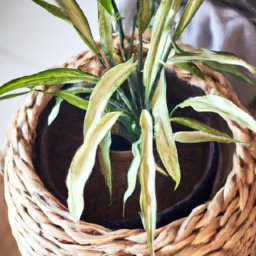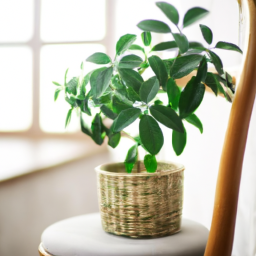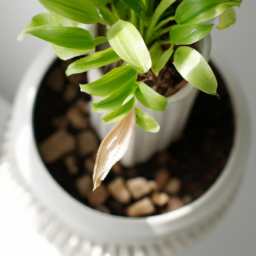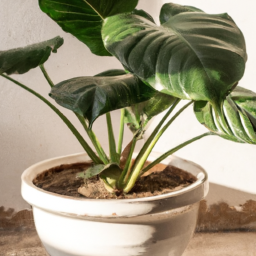
Are you looking to bring some greenery into your bedroom? Adding indoor plants can not only brighten up your space but also improve air quality and create a calming atmosphere. In this blog post, we will explore the best indoor plants for bedrooms that are low-maintenance and thrive in indoor environments. Whether you have a green thumb or are a beginner plant parent, there is a perfect plant out there for you. Let’s dive in and discover the perfect plants to liven up your bedroom sanctuary.
Benefits of Having Indoor Plants in Your Bedroom
Improved Air Quality
Indoor plants are not only aesthetically pleasing but they also play a crucial role in improving the air quality of your bedroom. Plants absorb carbon dioxide and release oxygen through the process of photosynthesis, which can help to purify the air in your bedroom. This can be especially beneficial if you suffer from allergies or respiratory issues, as certain plants can help to remove toxins and pollutants from the air, creating a healthier environment for you to sleep in.
In addition to releasing oxygen, some indoor plants can also help to increase humidity levels in your bedroom, which can be beneficial for those who suffer from dry skin or respiratory issues. Plants like peace lilies and spider plants are known for their ability to release moisture into the air, creating a more comfortable and soothing environment for you to relax in.
Furthermore, studies have shown that indoor plants can help to reduce levels of indoor air pollutants such as benzene, formaldehyde, and trichloroethylene, which are commonly found in household products and can have negative effects on your health. By introducing indoor plants into your bedroom, you can help to create a cleaner and healthier living space for yourself.
Enhanced Mental Well-being
In addition to improving air quality, indoor plants can also have a positive impact on your mental well-being. Studies have shown that being around plants can help to reduce stress, anxiety, and depression, and can even improve your mood and overall sense of well-being. The presence of plants in your bedroom can create a calming and relaxing atmosphere, which can help you to unwind and de-stress after a long day.
Furthermore, caring for indoor plants can be a therapeutic and rewarding experience, as it allows you to connect with nature and nurture living organisms. This can help to instill a sense of purpose and responsibility, which can be beneficial for your mental health. Additionally, the act of caring for plants can help to promote mindfulness and presence, as it encourages you to slow down and pay attention to the needs of the plants in your care.
Overall, having indoor plants in your bedroom can help to create a peaceful and harmonious environment that promotes relaxation, reduces stress, and enhances your overall mental well-being. So why not bring a touch of nature into your bedroom and experience the benefits for yourself?
Improved Sleep Quality
Another benefit of having indoor plants in your bedroom is that they can help to improve the quality of your sleep. Certain plants, such as lavender and jasmine, are known for their calming and soothing properties, which can help to promote relaxation and reduce anxiety, making it easier for you to fall asleep and stay asleep throughout the night.
In addition to their calming effects, some indoor plants can also help to regulate humidity levels in your bedroom, creating a more comfortable sleeping environment. Plants like aloe vera and snake plants are known for their ability to release moisture into the air, which can help to prevent dryness and irritation in your throat and nasal passages, allowing you to breathe more easily and sleep more soundly.
Furthermore, the presence of indoor plants in your bedroom can help to create a sense of tranquility and serenity, which can help to promote a restful and rejuvenating night’s sleep. By incorporating plants into your bedroom decor, you can create a peaceful and harmonious space that is conducive to relaxation and sleep, helping you to wake up feeling refreshed and revitalized each morning.

Top 5 Indoor Plants Recommended for Bedrooms
Peace Lily
Peace lilies are a popular choice for bedrooms because of their ability to purify the air and their low maintenance requirements. These plants thrive in low light conditions, making them perfect for bedrooms with limited natural light. Peace lilies are also known for their beautiful white flowers that can add a touch of elegance to any bedroom decor.
To care for a peace lily in your bedroom, make sure to keep the soil consistently moist but not waterlogged. Water the plant when the top inch of soil feels dry to the touch. Peace lilies also benefit from regular misting to increase humidity levels. Keep your peace lily away from direct sunlight to prevent leaf burn.
Overall, peace lilies are a great choice for bedrooms due to their air-purifying qualities and aesthetic appeal. Consider adding a peace lily to your bedroom to create a calming and peaceful environment.
Spider Plant
Spider plants are another excellent choice for bedrooms because of their air-purifying properties and easy care requirements. These plants are known for their long, arching leaves with white stripes, giving them a unique and attractive appearance. Spider plants thrive in bright, indirect light but can also tolerate lower light conditions.
To care for a spider plant in your bedroom, water it regularly but allow the soil to dry out between waterings. Spider plants prefer well-draining soil and benefit from occasional fertilization during the growing season. These plants are also known for producing baby spider plants, which can be propagated and shared with friends and family.
Overall, spider plants are a versatile and low-maintenance option for bedrooms. Consider adding a spider plant to your bedroom to enjoy its air-purifying benefits and aesthetic appeal.
Snake Plant
Snake plants, also known as mother-in-law’s tongue, are a popular choice for bedrooms because of their air-purifying qualities and unique appearance. These plants have tall, sword-shaped leaves that can add a touch of drama to any bedroom decor. Snake plants are also incredibly resilient and can thrive in low light conditions.
To care for a snake plant in your bedroom, water it sparingly and allow the soil to dry out between waterings. Snake plants are drought-tolerant and prefer well-draining soil. These plants are also known for their ability to remove toxins from the air, making them a great choice for improving indoor air quality.
Overall, snake plants are a stylish and low-maintenance option for bedrooms. Consider adding a snake plant to your bedroom to enjoy its air-purifying benefits and striking appearance.
ZZ Plant
ZZ plants are a popular choice for bedrooms because of their ability to thrive in low light conditions and their unique appearance. These plants have glossy, dark green leaves that can add a touch of sophistication to any bedroom decor. ZZ plants are also incredibly low-maintenance and can tolerate neglect.
To care for a ZZ plant in your bedroom, water it sparingly and allow the soil to dry out completely between waterings. ZZ plants prefer well-draining soil and can benefit from occasional fertilization during the growing season. These plants are also known for their air-purifying qualities, making them a great choice for bedrooms.
Overall, ZZ plants are a stylish and easy-care option for bedrooms. Consider adding a ZZ plant to your bedroom to enjoy its unique appearance and air-purifying benefits.
Philodendron
Philodendrons are a versatile choice for bedrooms because of their air-purifying properties and attractive foliage. These plants have heart-shaped leaves that can add a touch of warmth to any bedroom decor. Philodendrons thrive in bright, indirect light but can also tolerate lower light conditions.
To care for a philodendron in your bedroom, water it regularly but allow the soil to dry out between waterings. Philodendrons prefer well-draining soil and can benefit from occasional fertilization during the growing season. These plants are also known for their ability to remove toxins from the air, making them a great choice for improving indoor air quality.
Overall, philodendrons are a beautiful and low-maintenance option for bedrooms. Consider adding a philodendron to your bedroom to enjoy its air-purifying benefits and attractive foliage.

Tips for Caring for Indoor Plants in Your Bedroom
Choosing the Right Plants
When it comes to selecting indoor plants for your bedroom, there are a few key factors to consider. First and foremost, you’ll want to choose plants that thrive in low light conditions, as bedrooms typically don’t get as much natural sunlight as other rooms in the house. Some great options for low light plants include snake plants, pothos, and peace lilies. Additionally, you’ll want to consider the size of the plant and make sure it fits well in the space you have available.
Once you’ve chosen the right plants for your bedroom, it’s important to consider the care they will require. Different plants have different watering and fertilizing needs, so be sure to do your research and understand what each plant requires to thrive. Overwatering is a common mistake that can lead to root rot, so be sure to let the soil dry out between waterings. Additionally, make sure to regularly dust the leaves of your plants to ensure they can properly absorb sunlight.
Placement and Lighting
When it comes to placing your indoor plants in your bedroom, it’s important to consider the lighting conditions. While bedrooms typically have lower light levels than other rooms in the house, you’ll still want to place your plants near a window where they can receive some natural sunlight. If your bedroom doesn’t get much natural light, you may want to consider supplementing with a grow light to ensure your plants are getting the light they need to thrive.
In addition to lighting, you’ll also want to consider the temperature and humidity levels in your bedroom. Most indoor plants prefer temperatures between 65-75 degrees Fahrenheit and humidity levels between 40-60%. If your bedroom tends to be on the cooler side, consider placing a humidifier near your plants to help increase the humidity levels.
Regular Maintenance
Once you’ve chosen the right plants for your bedroom and placed them in the optimal location, it’s important to establish a regular maintenance routine to ensure they stay healthy and thriving. This includes watering your plants as needed, checking for signs of pests or disease, and regularly pruning and repotting as needed.
When it comes to watering your plants, it’s important to water them thoroughly but allow the soil to dry out between waterings to prevent root rot. Additionally, be sure to regularly check the leaves of your plants for any signs of pests or disease, such as yellowing leaves or sticky residue. If you notice any issues, be sure to address them promptly to prevent them from spreading to other plants.
In addition to regular watering and pest control, be sure to regularly prune your plants to promote healthy growth and repot them as needed to prevent them from becoming root bound. By following these tips for caring for indoor plants in your bedroom, you can create a peaceful and relaxing environment that promotes better sleep and overall well-being.
Let’s bring it all home
If you’re looking to bring some greenery into your bedroom, there are plenty of indoor plants that can thrive in this space. One popular choice is the snake plant, which is known for its ability to purify the air and thrive in low light conditions. This plant is also low maintenance, making it perfect for those who don’t have a green thumb.
Another great option for the bedroom is the peace lily, which not only adds a touch of elegance with its white flowers, but also helps to improve air quality. This plant thrives in low light and doesn’t require frequent watering, making it ideal for busy individuals. Adding a few indoor plants to your bedroom can not only enhance the aesthetic appeal of the space, but also provide numerous health benefits, making it a win-win situation for both you and your plants.
Frequently Asked Questions (FAQ):
Q1: What are the best indoor plants for bedrooms?
A1: Some of the best indoor plants for bedrooms include snake plants, peace lilies, spider plants, pothos, and aloe vera. These plants are known for their air-purifying qualities and ability to thrive in low light conditions, making them perfect for bedroom environments.
Q2: Do indoor plants help improve air quality in bedrooms?
A2: Yes, indoor plants are known to improve air quality by removing toxins and releasing oxygen. Plants like snake plants and peace lilies are particularly effective at purifying the air, making them great choices for bedrooms where you want to breathe cleaner air while you sleep.
Q3: How do I take care of indoor plants in my bedroom?
A3: To take care of indoor plants in your bedroom, make sure to place them in a spot with indirect sunlight, water them regularly but avoid overwatering, and occasionally dust their leaves to keep them clean. It’s also important to monitor the humidity levels in your bedroom to ensure your plants thrive.
Q4: Can indoor plants help reduce stress and promote relaxation in bedrooms?
A4: Yes, indoor plants have been shown to have a calming effect on people and can help reduce stress levels. Having plants in your bedroom can create a soothing environment that promotes relaxation, making it easier for you to unwind and get a good night’s sleep.
Q5: Are there any indoor plants that are easy to care for in bedrooms?
A5: Yes, there are several indoor plants that are easy to care for in bedrooms, such as spider plants, pothos, and snake plants. These plants require minimal maintenance and can thrive in low light conditions, making them ideal for beginners or those with busy schedules.
Dr. Olivia Green is a botanist with over two decades of experience in indoor plant cultivation. She holds a Ph.D. in Plant Biology and has dedicated her career to researching plant behavior in controlled environments. Dr. Green is passionate about helping plant enthusiasts master the art of indoor gardening through her extensive knowledge and practical insights.


